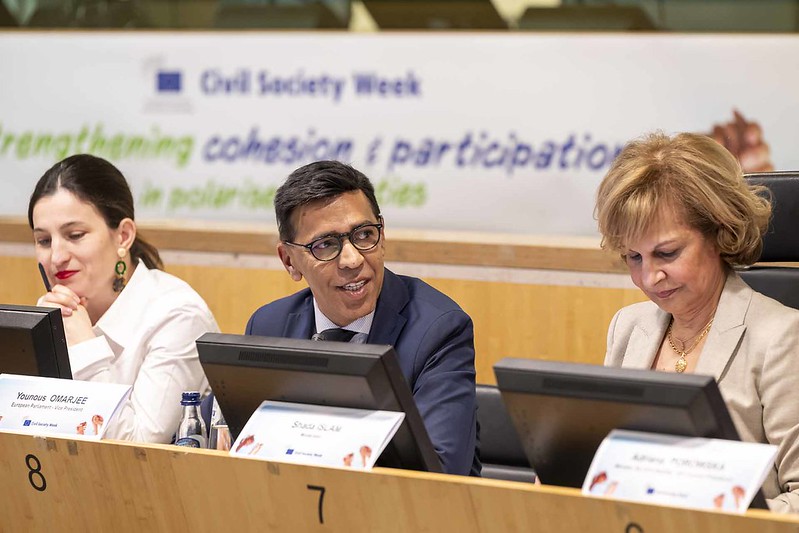The European Economic and Social Committee (EESC) celebrated the Civil Society Week 2025, held from March 17 to 20 in Brussels, under the theme “Strengthening Cohesion and Participation in Polarized Societies.” The event brought together more than 800 people, including representatives from civil society organizations (CSOs) and the European social economy, including cooperatives, NGOs, and youth associations, as well as a wide range of stakeholders and journalists from various media outlets.
Civil Society Week provided a participatory platform with critical debates, best practices, and the development of solutions to promote social cohesion and strengthen democratic engagement.
This event, which spanned three full days, began with an opening ceremony in which Oliver Röpke, President of the EESC, and Albena Azmanova, Professor at City Saint George’s University in London, participated. Azmanova delivered the keynote speech titled “From Polarisation to Collaboration: Can Democracies Dream Big Again?”. See the opening session summary here
Through debates and workshops, participants explored ways to promote social cohesion, enhance democratic participation, and develop strategies and policies that empower civil society and defend European values.
Several high-level panels and working sessions were organized to address crucial topics such as: strengthening cohesion through education and culture; the role of civil society organizations in the European Citizens’ Initiative; Towards more affordable, democratic, and sustainable housing in Europe; Foresight for a just, inclusive, and green-blue growth transition; Towards a European strategy for civil society, as well as the involvement of youth in shaping a stronger, more resilient Europe.
Social Economy Europe (SEE) participated in organizing the session on Technology for the Common Good, together with La Coop des Communs, the European Association of Institutes for Vocational Training (EVBB), the European Parents’ Association (EPA), and the European Citizen Action Service (ECAS). This session was organized in the style of a world café with different tables discussing the principles of social economy as drivers of a democratic digital space; digital skills and education; artificial intelligence to empower citizens; digital participation, as well as the digital market, workers, and the economy.
The results of this session can be found here
At the conclusion of Civil Society Week, the EESC President stated: “I am deeply inspired by the energy, resilience, and commitment of civil society actors across Europe. In an era of growing challenges – democratic backsliding, misinformation, and social polarization – civil society remains a vital force for unity, justice, and democratic participation. This week has shown that when civil society comes together, we can forge solutions that strengthen our democracy, promote social cohesion, and build an Europe that truly works for its citizens.”
For more information on the entire civil society week, recordings, and conclusions, visit: https://www.eesc.europa.eu/en/agenda/our-events/events/eesc-civil-society-week-2025/webstream







